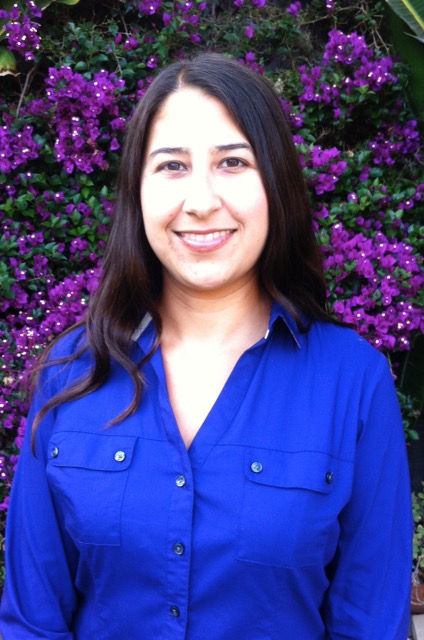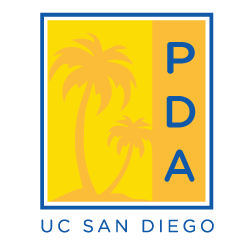
Desirée L. Salazar, Ph.D.
Scientific Program Manager | American Society for Cell Biology

- Interview Overview
Interview Overview
Interview by: Alexandra Bortnick
Interview: May 2016
Transition: May 2015
1. Please list your previous department at UC San Diego and provide a brief description of the research you conducted.
I was a postdoc with Don Cleveland in the Department of Cellular and Molecular Medicine. I studied the fatal progressive neurodegenerative disease Amyotrophic Lateral Sclerosis (ALS) and investigated a gene therapy approach to help slow disease progression in a transgenic mouse model of ALS. I was also involved in a larger collaborative project to investigate stem cell transplantation as a therapeutic for ALS. During my postdoc I was a fellow of the IRACDA program and had the opportunity to teach in courses and mentor students at San Diego State University.
2. Please describe your current job profile.
I am currently a Scientific Program Manager at the American Society for Cell Biology (ASCB). My role is to help promote scientific and career development activities for our members and help foster a diverse and international workforce in the field of cell biology. I work with several committees of ASCB and help plan programs throughout the year and at our annual meeting to meet the needs of our members. Because we are a relatively small staff I have the opportunity to contribute to many of ASCB’s activities and programs.
3. What made you decide to transition into your current position?
After completing my postdoc I became the educational coordinator of the San Diego IRACDA program. In that role, I helped promote the career development of postdocs pursuing academic careers with the goal of achieving a more diverse academic workforce. I was very much enjoying that position when my husband, also a Ph.D scientist and former UCSD postdoc, was offered a promotion opportunity that required relocation to the Washington, DC area. Because the DC area is home to the NIH and many scientific societies, I was optimistic that I would be able to find an opportunity to continue to pursue a career in science administration. We decided to make the move and I began searching for jobs in the DC area. When we arrived in DC, I did not have a job lined up but was fortunate to find a few opportunities aligned with my skills and interests to apply for, and I landed at ASCB soon after I arrived.
4. Apart from the research you conducted, do you feel like anything in particular has helped you acquire your current position?
Absolutely! Throughout my career, starting as a grad student, I made an effort to broaden my skill set and take advantage of opportunities to help mentor students and get involved in programs that provide students with career development opportunities. I mentored students in the lab and volunteered to mentor students in a summer research program by helping them to develop presentation skills. I focused on developing my communication skills and took advantage of opportunities to share my science with patients, high school students, and members of the public. Joining the IRACDA program as a postdoc provided the opportunity to develop teaching skills, provided additional career development resources and access to several additional mentors beyond my research advisor. Ultimately, it was my network of mentors and sponsors that led me to the jobs I have had since finishing my postdoc. The most critical thing that led to me getting these jobs was that my mentors were aware of my interests and directed me towards available opportunities that I would have not otherwise known about.
5. Is there any specific challenge (during the entire process of transitioning) that you would like to highlight and, if so, how did you overcome it?
I enjoyed many of the aspects of being a scientist: designing and planning experiments, mentoring students, preparing presentations, communicating my research to a variety of audiences, and teaching. But despite having a great research project that was going well I came to the realization that I did not enjoy doing bench research and needed to transition to a position where I could utilize my skills in a different way and pursue what I enjoyed doing. Though I was aware that only a small percentage of postdocs will become research faculty and I was always open to the idea of pursuing a career in science administration it was a bit of a struggle to come terms with the decision to leave the bench. This was certainly a result of the academic culture that I had been entrenched in that promotes an academic career as the pinnacle of success. Because of the realities of the job market I see the culture beginning to change but I think it will be a slow process. Once I made the decision and openly told people about my goals it helped me to focus on moving forward. Finding a job that I enjoy and being satisfied with my work-life balance and compensation helped overcome this transient struggle. I am frequently asked whether I miss the bench and I can confidently say that I do not.
6. Please describe your goals and ambitions for the next 5 years?
My goal is to continue broadening my skill set and expanding my network of mentors and sponsors. I love having the opportunity to meet and network with both peers and people more advanced in their careers and learning about the variety of jobs available for people with my skills and interests. My current focus is on helping to provide career development resources to scientists, especially those early in their career, with the goal of promoting diversity within the scientific workforce. Presently, I think this will be a major theme of my career but I I cannot predict the opportunities that may arise. I aspire to continue to grow my skills and responsibilities and pursue roles with increased leadership in the next 5 years.
7. What do you feel you could have done more, as a postdoc, to help prepare you for or acquire your current position?
I am fortunate that I had a great postdoc experience and as a fellow of the IRACDA program I was able to expand my professional skills and my network of mentors which were critical to helping me in the preparation and acquisition of my present position.
8. What do you feel is the most important advice you can give to a current UC San Diego postdoc in order for them to obtain a position such as yours?
It is critical to develop a variety of skills beyond your technical skills and you should strive to take advantage of any opportunities you have to teach, mentor, communicate with the public, organize conferences, and/or participate in groups like the PDA or get involved with your scientific society. Doing these things will help build your professional skills and broaden your network which I believe is very critical to helping you find a job whether you want to stay in research or pursue a career away from the bench. Lastly, once you have decided to focus on a specific career path, be sure to tell your network so they can help you find opportunities.
